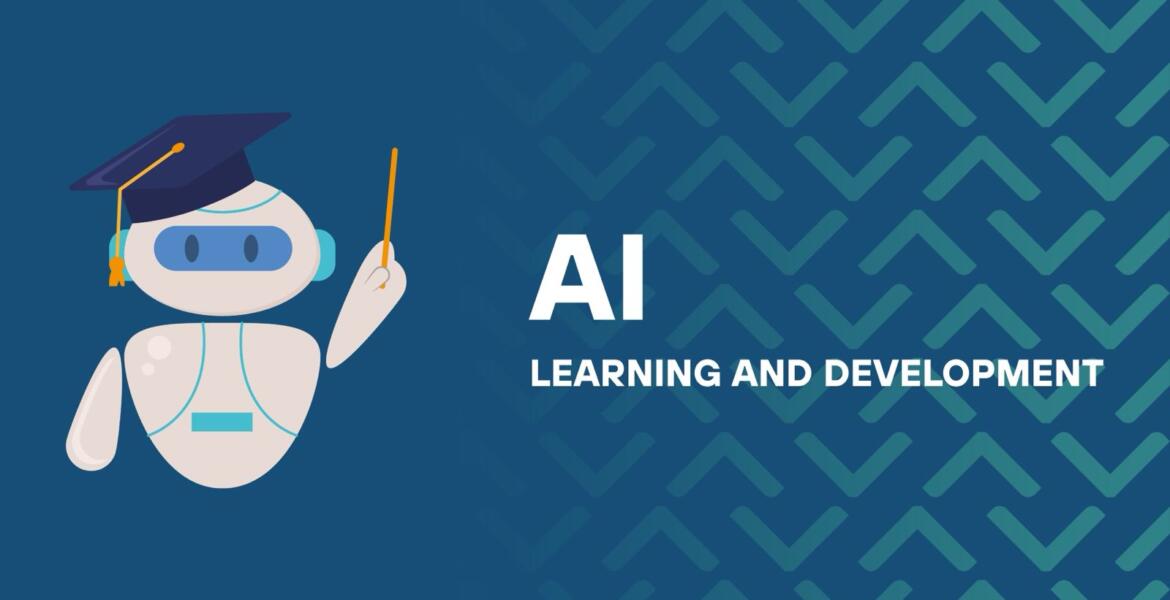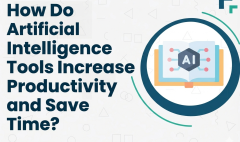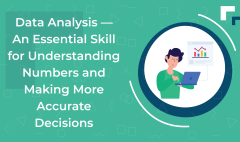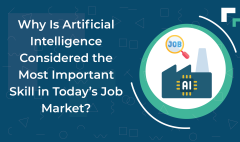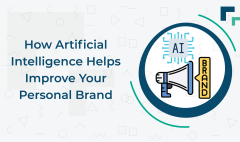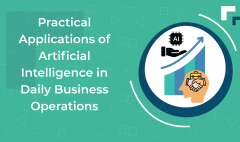Artificial Intelligence, Education, and Development
1. Artificial Intelligence and Its Relationship to Training
Artificial Intelligence (AI) is no longer a futuristic or purely scientific concept, it is now a reality that affects every aspect of our lives, especially training. AI refers to the ability of machines and systems to simulate human cognitive functions such as understanding, learning, analysis, and decision making.
In the field of training, AI has triggered a true revolution. Technology is no longer just a supportive tool; it now plays an active role in analyzing trainee performance, providing feedback, personalizing curricula, and even simulating the role of a trainer.
Imagine having a system that monitors a trainee’s progress, identifies their weaknesses, and delivers customized content. This is not science fiction, it’s a reality being implemented in smart centers and universities around the world.
The relationship between AI and training is complementary. AI enhances the instructor’s capabilities, saves time, and provides a personalized and effective learning experience. At the same time, education and training environments drive AI to evolve through real-world applications and ongoing challenges.
2. Enhancing Training Quality Using AI
AI is a core component of modern training centers, improving course planning, delivery methods, and trainee evaluation mechanisms. By integrating AI technologies, training programs can be redesigned to be more efficient, flexible, and tailored to individual needs leading to better results in less time.
– Content Development
AI can analyze large data sets and identify topics trainees find difficult, allowing content to be updated accordingly. Some systems can even auto generate learning materials that match a trainee’s level and comprehension.
– Evaluation Methods
Instead of relying solely on traditional tests, AI can track trainee performance across tasks and provide comprehensive assessments such as tracking time spent understanding a concept or analyzing behavior during learning activities.
– Training Environment Innovation
AI, along with augmented reality (AR) and virtual reality (VR), transforms traditional training into an interactive experience. Trainees can now simulate real life work situations or explore complex concepts visually like navigating the human body to understand anatomy or interacting with 3D models for job simulations.
These technologies not only improve training tools but also reshape learning objectives to align with market demands and enhance digital age skills.
3. AI and Personalized Training
AI has revolutionized Personalized Learning, a key concept in modern training centers. Trainees are no longer bound to follow a uniform learning path; instead, AI enables the design of individualized training experiences based on current skills, interests, and preferred learning styles.
– How AI Enables Personalization
Smart systems analyze a trainee’s interactions with training material, what they mastered quickly, where they struggled, and what topics interest them. Based on this data, the system builds a custom learning path, offering activities that target each individual’s growth areas.
Imagine you’re in a training room: instead of handing out the same exercise to everyone, each person receives a customized activity designed to improve their specific weaknesses. That’s the true power of AI driven personalized training.
– Benefits of Personalized AI Powered Training
- Better Understanding and Retention: Content is delivered at the right level for each trainee.
- Increased Engagement: Trainees move at their own pace, leading to higher motivation and participation.
-
Faster Skill Development: Lagging trainees can catch up more effectively, while advanced learners progress faster and deeper. 4. AI in Trainer Development
While AI is a cutting edge product of modern technology, it adds an unprecedented human dimension to training addressing individual differences and providing growth opportunities tailored to each trainee’s capabilities.
– AI and the Role of Trainers
Contrary to fears that AI might replace trainers, it actually redefines and enhances their roles. AI supported training centers focus on empowering instructors with tools that refine their teaching methods and keep them up to date.
– Smart Tools for Trainers
Today, there are intelligent platforms that help trainers develop advanced skills through personalized content and performance analytics. Key training areas include:
- Managing interactive classrooms effectively
- Integrating technology into teaching for maximum impact
- Analyzing trainee performance to identify learning gaps
- Delivering real time, intelligent feedback for improvement
– Trainer Performance Analytics
AI systems can evaluate trainer effectiveness using feedback, video analysis, or daily interaction data offering actionable insights for development.
– Decision Making Support
Using intelligent analytics, trainers can identify who needs extra support, who is ready for more challenges, and how to improve lesson planning.
The modern trainer is not just a content deliverer but a learning leader who uses AI insights to provide better education.
5.Remote Training and Technological Evolution
With the advancement of AI, remote training has become more interactive and personalized than ever. It’s no longer just content delivery, it’s a dynamic, smart environment.
– AI Powered Remote Platforms
Modern e-learning platforms use AI to deliver personalized experiences that include:
- Smart assistants to answer questions instantly
- Resource recommendations based on behavior
- Intelligent reminders and study time management
– Interactive Remote Learning
AR and VR allow trainees to conduct science experiments or explore 3D models from home, adding realism to online education.
– Recovering Learning Loss
AI can automatically deliver remedial content to trainees who show signs of falling behind without requiring direct trainer intervention.
Remote training, with AI support, is now a complete educational environment, not just a temporary alternative.
6. Continuous Development Through AI
AI is not a one time application; it supports ongoing improvement. This adaptability allows training institutions to evolve continuously based on data driven insights.
– Real Time Performance Analysis
Smart centers monitor trainee progress instantly, providing detailed reports on strengths and weaknesses enabling rapid, targeted interventions.
– Auto Updating Content
AI can update training content based on curriculum changes or trainee behavior. This keeps materials always fresh and relevant without manual updates.
– Institutional Development
Beyond training itself, AI improves administrative processes analyzing absentee rates, trainer efficiency, and trainee satisfaction to guide strategic decisions.
7. Opportunities and Challenges
While AI offers massive opportunities, it also brings challenges that require thoughtful planning and regulation.
Key Opportunities:
- Personalized learning for every trainee
- Time and effort savings for trainers
- Improved accuracy in assessments
- Expanding training access to remote regions
Main Challenges:
- Technical Infrastructure Gaps: Some centers lack the tools to adopt AI.
- Data Privacy Concerns: Managing sensitive information responsibly is crucial.
- Overdependence on Technology: A balance between human interaction and automation is vital.
- Lack of Skilled Personnel: There’s a need for investment in AI training for educators and staff.
- The Future of AI in Training
We are not just witnessing a technological shift but a fundamental transformation in education.
– Predictive Learning
AI will predict trainee outcomes and suggest early interventions to prevent dropouts or performance declines.
– Mobile and Real Time Training
Trainees will learn anywhere, anytime through AI powered apps offering real time feedback and interaction.
– New Trainer Roles
Trainers will become mentors and facilitators, using AI tools to provide custom support and address complex cases.
The future of training blends tech efficiency with human empathy, creating a more inclusive and effective learning environment.
9. AI in Content Development
Unlike static traditional curricula, AI allows for flexible and specialized content creation. It analyzes workforce demands and rapidly updates training materials to match real world skills.
– Personalized Curricula
Each trainee can follow a unique learning path suited to their level and interests.
– New Concepts
AI tools like machine learning and data analysis are being taught within training programs themselves.
– Dynamic Course Design
AI tracks the effectiveness of every module. If something doesn’t work, it’s updated immediately resulting in highly adaptive and relevant training content.
The Future of AI Driven Training Development
In summary, AI is not here to replace educators but to enhance their role and empower them with better tools. It transforms the learning environment into something interactive, flexible, and deeply responsive to learner needs.
In the near future, AI will be present in every stage of the educational process from planning to real time feedback to continuous instructor development. It’s a powerful leap toward a smarter, more human centered training ecosystem.
FAQs
– Can AI replace trainers?
No. AI is a supportive tool that enhances trainer performance. The human element remains essential in education.
– How does AI improve training quality?
Through personalized learning, advanced assessments, smart recommendations, and data driven decisions.
– Are there risks to using AI in training?
Yes, such as privacy breaches, overreliance on automation, and algorithmic bias. These can be mitigated with clear policies and ethical standards.
– Is AI-based training suitable for everyone?
It requires strong digital infrastructure, which may not be available everywhere without governmental or institutional support.
– How can training centers adopt AI?
By training educators, investing in smart tools, and starting with basic AI applications like intelligent assessments and digital assistants.

